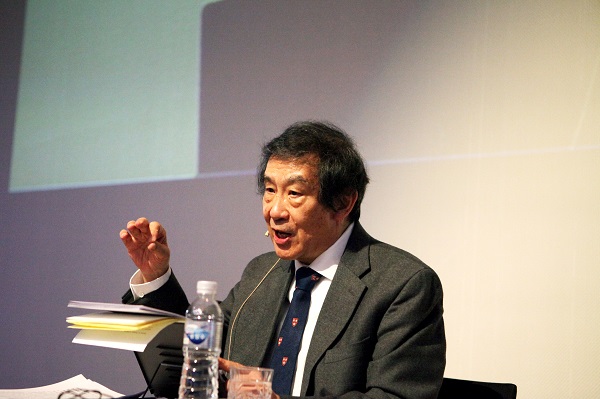
Confucian Lecture by Tu Weiming
On November 17, the 5th Soongsil Presidential Lecture was held in Reverend Han Kyungchik Memorial Hall. For the lecture, Professor Tu Weiming (Tu), the New Confucian scholar, was invited. Professor Tu was born in China and grew up in Taiwan. He earned his M.A. (Master of Arts) and Ph.D. (Doctor of Philosophy) from Harvard University. Today, he is Chair Professor of Humanities and Founding Director of the Institute for Advanced Humanistic Studies at Peking University. He is also the Research Professor and Senior Fellow of Asia Center at Harvard University.
Before the lecture, Professor Kim Si-cheon(Department of Philosophy) briefly elucidated the history of Confucianism. The Confucianism is divided into the first, second and third generation. Tu is a prominent member of the third generation of New Confucians. The first generation of Confucianism is originated from Confucius. The second generation of Confucianism is generally known in Korea as the Confucianism of the Joseon Dynasty period. It is also called Neo-Confucianism. The third generation is named Modern Neo-Confucianism, which signifies the new Confucianism that was studied and spread out since the 1970s.
<Confucian Wisdom for the Future of Humanity>
The above strapline is the subject of the talk. Tu said that it could be extensive and hard to understand but his theory is very simple. Some paragraphs are not same with all the contents of this lecture. But one of the important points he emphasized is that ‘we become a human being through learning as well as achieving external growth.’ Human beings are relational, situated, contextualized and functionally different. Therefore, people can contribute to public interests when learning to become socially desirable and necessary.
Another important lesson is that the understanding on other people should be done before self-comprehension. It means the relationship between oneself and others comes first. For example, as a person receives love from his or her parents, they learn the value of interaction. Therefore, as one grows up, the individual gradually appreciates the necessity of thinking and acting for other.
According to the word of Mencius, all human beings have an empathy ability. But, when they do not develop the ability, it would dissipate. Tu strongly expressed that human beings without empathy can not be accepted as a human being any more because of dehumanization.
Tu Weiming suggested ‘benevolence(he translates it as ‘humanity’)’ as a universal value which enhances cooperation in the international community. Domination strategy made humanists of the 21st century unilateral. However, most humanists actually regard differences as precondition for harmony. Harmony without uniformity and with accepting differences is the right way.
Choi Ga-yeong (Culture Editor)
qufrnal@ssu.ac.kr
저작권자 © The Soongsil Times(숭실대영자신문) 무단전재 및 재배포 금지


